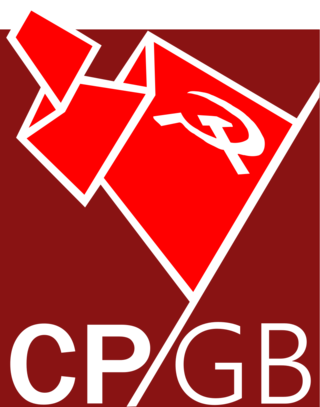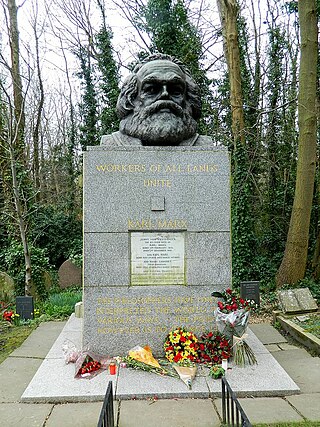Related Research Articles
Libertarian socialism is an anti-authoritarian and anti-capitalist political current that emphasises self-governance and workers' self-management. It is contrasted from other forms of socialism by its rejection of state ownership and from other forms of libertarianism by its rejection of private property. Broadly defined, it includes schools of both anarchism and Marxism, as well as other tendencies that oppose the state and capitalism.

The Communist Party of Great Britain is a political group which publishes the Weekly Worker newspaper. The CPGB (PCC) claims to have "an internationalist duty to uphold the principle, 'One state, one party'. To the extent that the European Union becomes a state then that necessitates EU-wide trade unions and a Communist Party of the EU". In addition, it is in favour of the unification of the entire working class under a new Communist International. It is not to be confused with the former Communist Party of Great Britain, the Communist Party of Great Britain (Marxist–Leninist), or the current Communist Party of Britain.

The New Communist Party of Britain is an anti-revisionist Marxist–Leninist communist party in Britain. The origins of the NCP lie in the Communist Party of Great Britain from which it split in 1977. The organisation takes an anti-revisionist stance on Marxist–Leninism and is opposed to Eurocommunism. After the fall of the Soviet Union the party was one of two original British signatories to the Pyongyang Declaration in 1992. It publishes a newspaper named The New Worker.
The Weekly Worker is a newspaper published by the Communist Party of Great Britain (CPGB-PCC). The paper is known on the left for its polemical articles, and for its close attention to Marxist theory and the politics of other Marxist groups. It claims a weekly online readership averaging over 20,000, Weekly Worker simultaneously also distributes 500 physical copies a week.
Christopher Agamemnon Pallis was an Anglo-Greek neurologist and libertarian socialist intellectual. Under the pen-names Martin Grainger and Maurice Brinton, he wrote and translated for the British group Solidarity from 1960 until the early 1980s. As a neurologist, he produced the accepted criteria for brainstem death, and wrote the entry on death for Encyclopædia Britannica.
In Marxism, ultra-leftism encompasses a broad spectrum of revolutionary communist currents that are generally Marxist and frequently anti-Leninist in perspective. Ultra-leftism distinguishes itself from other left-wing currents through its rejection of electoralism, trade unionism, and national liberation. The term is sometimes used as a synonym of left communism. "Ultra-left" is also commonly used as a pejorative by Marxist–Leninists and Trotskyists to refer to extreme or uncompromising Marxist sects.
A political international is a transnational organization of political parties having similar ideology or political orientation. The international works together on points of agreement to co-ordinate activity.

Communist Students is a Marxist student group, autonomous from but politically close to the Communist Party of Great Britain. It was launched at a founding conference in December 2006, with the adoption of a constitution and programme, and election of executive members. At its 2010 conference members of Communist Students voted overwhelmingly to change its constitution and declared itself an autonomous organisation.

The American left can refer to multiple concepts. It is sometimes used as a shorthand for groups aligned with the Democratic Party. At other times, it refers to groups that have sought egalitarian changes in the economic, political, and cultural institutions of the United States. Various subgroups with a national scope are active. Liberals and progressives believe that equality can be accommodated into existing capitalist structures, but they differ in their criticism of capitalism and on the extent of reform and the welfare state. Anarchists, communists, and socialists with international imperatives are also present within this macro-movement. Many communes and egalitarian communities have existed in the United States as a sub-category of the broader intentional community movement, some of which were based on utopian socialist ideals. The left has been involved in both the Democratic and Republican parties at different times, having originated in the Democratic-Republican Party as opposed to the Federalist Party.
State socialism is a political and economic ideology within the socialist movement that advocates state ownership of the means of production. This is intended either as a temporary measure, or as a characteristic of socialism in the transition from the capitalist to the socialist mode of production or to a communist society. State socialism was first theorised by Ferdinand Lassalle. It advocates a planned economy controlled by the state in which all industries and natural resources are state-owned.
Solidarity was a small libertarian socialist organisation from 1960 to 1992 in the United Kingdom. It published a magazine of the same name. Solidarity was close to council communism in its prescriptions and was known for its emphasis on workers' self-organisation and for its radical anti-Leninism.

The Communist Party of Great Britain (Marxist–Leninist), abbreviated CPGB-ML, is an anti-revisionist Marxist–Leninist communist party in the United Kingdom, active in England, Scotland, and Wales. The CPGB-ML was founded by Harpal Brar after a split from the Socialist Labour Party (SLP) on 3 July 2004. The CPGB-ML publishes the bimonthly newspaper Proletarian, and the Marxist–Leninist journal Lalkar is also closely allied with the party. The party chair is Ella Rule.
A workers' council, also called labor council, is a type of council in a workplace or a locality made up of workers or of temporary and instantly revocable delegates elected by the workers in a locality's workplaces. In such a system of political and economic organization, the workers themselves are able to exercise decision-making power. Furthermore, the workers within each council decide on what their agenda is and what their needs are. The council communist Antonie Pannekoek describes shop-committees and sectional assemblies as the basis for workers' management of the industrial system. A variation is a soldiers' council, where soldiers direct a mutiny. Workers and soldiers have also operated councils in conjunction. Workers' councils may in turn elect delegates to central committees, such as the Congress of Soviets.
The Alliance for Workers' Liberty (AWL), also known as Workers' Liberty, is a Trotskyist group in Britain and Australia, which has been identified with the theorist Sean Matgamna throughout its history. It publishes the newspaper Solidarity.

Far-left politics in the United Kingdom have existed since at least the 1840s, with the formation of various organisations following ideologies such as Marxism, revolutionary socialism, communism, anarchism and syndicalism.
References
- ↑ "Another Bloody Party". Weekly Worker.
- ↑ Weekly Worker 542.
- ↑ "Another bloody party".
- ↑ "Spoiling your ballot".